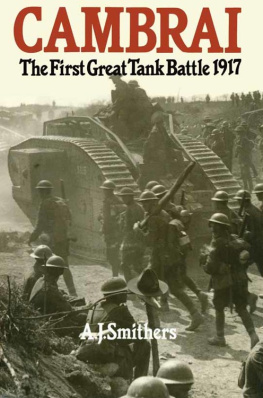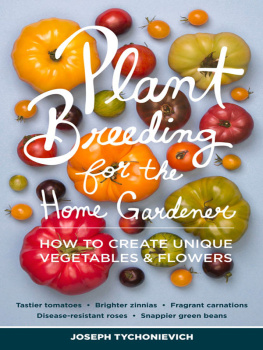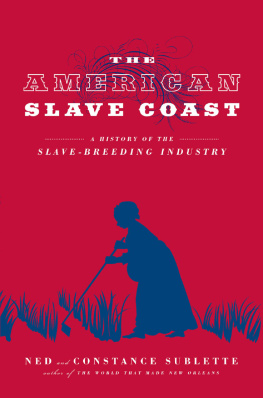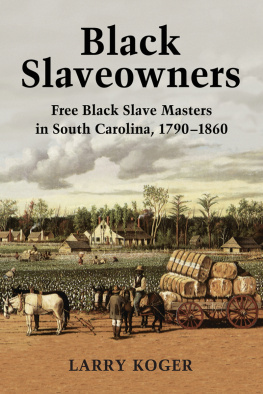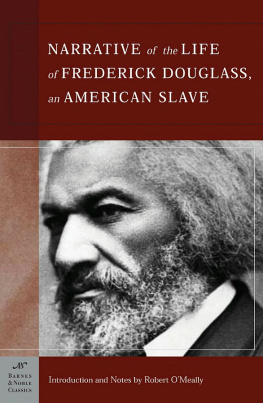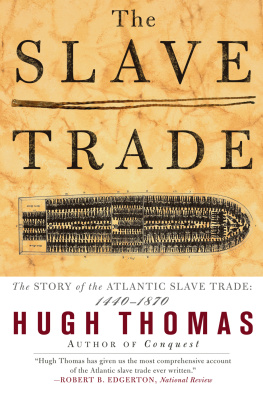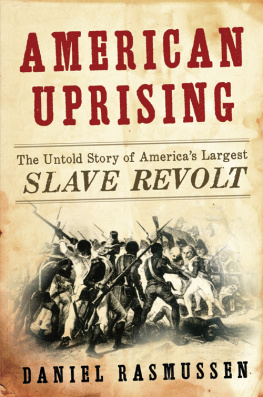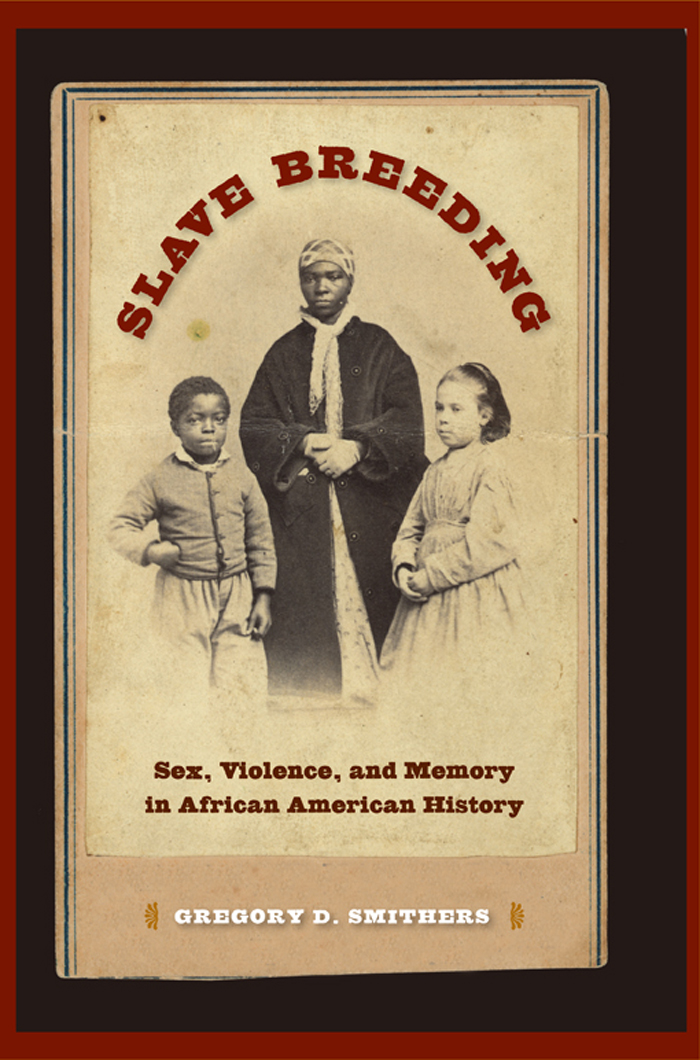Slave Breeding

UNIVERSITY PRESS OF FLORIDA
Florida A&M University, Tallahassee
Florida Atlantic University, Boca Raton
Florida Gulf Coast University, Ft. Myers
Florida International University, Miami
Florida State University, Tallahassee
New College of Florida, Sarasota
University of Central Florida, Orlando
University of Florida, Gainesville
University of North Florida, Jacksonville
University of South Florida, Tampa
University of West Florida, Pensacola

Slave Breeding
Sex, Violence, and Memory in African American History
GREGORY D. SMITHERS
University Press of Florida
Gainesville Tallahassee Tampa Boca Raton
Pensacola Orlando Miami Jacksonville Ft. Myers Sarasota
Copyright 2012 by Gregory D. Smithers
All rights reserved
Printed in the United States of America. This book is printed on Glatfelter Natures
Book, a paper certified under the standards of the Forestry Stewardship Council (FSC).
It is a recycled stock that contains 30 percent post-consumer waste and is acid-free.
17 16 15 14 13 12 6 5 4 3 2 1
A record of cataloging-in-publication data is available from the Library of Congress.
ISBN 978-0-8130-4238-1
University Press of Florida
15 Northwest 15th Street
Gainesville, FL 32611-2079
http://www.upf.com

For my teacher, Clarence E. Walker.
Thank you.
CONTENTS
FIGURES
ACKNOWLEDGMENTS
In the course of writing this book, I received insights, criticisms, and suggestions from some wonderfully generous scholars. I am particularly indebted to my best man, Brian Behnken. Brians own work will change our understanding of the civil rights movement, and I am eternally grateful to him for taking time away from his work to give his detailed and careful reading of much of this book. I also extend my gratitude to David Barber, Trevor Burnard, Rebecca Fraser, Alan Gallay, Kwasi Konadu, Peter Onuf, Ben Schiller, Carolyn Strange, Kathleen Wilson, and Michael Ondaatje, all of whom pushed me to think through various portions of my analysis. Special acknowledgment is owed to the brilliant Steven Deyle for the support he has offered to this project over the years. I thank you all for your counsel and take full responsibility for any shortcomings in the analysis that follows. Finally, Id like to extend my appreciation to Meredith Morris-Babb, the director at the University Press of Florida, for her continued support of this book.
Id also like to acknowledge one very important person. To Paul Spickard, one of the most generous and kindhearted individuals Ive had the good fortune to meet, I thank you for your guidance over many years. Paul has supported my career for some time. For his mentorship, and the example he sets as a creative and original historian, I extend my deepest gratitude.
Thanks also go to the University of Aberdeen and the Library Company of Philadelphia for providing financial support. This support enabled me to complete portions of the research for this book. I would also like to extend my thanks to the History Department and the Centre for Cultural History at the University of Aberdeen for allowing me to present portions of my research. The feedback I received from these events helped to clarify my thinking on some critical areas of my analysis. And to Andrew MacKillop, my mentor during my time at the University of Aberdeen, I am grateful for the time you took to listen to me talk about the subject matter contained in this book over many strong libations. You are a patient and very collegial man indeed.
I owe a special word of acknowledgment and thanks to my colleague and friend, Clarence E. Walker. I would not have written this book had Professor Walker not instilled in me long ago the importance of reading widely, researching thoroughly, and unflinchingly analyzing historys more unpleasant events and people. Professor Walkers guidance as a teacher, his willingness to suffer (and at times, not to suffer) my impudence, and his generosity and good humor have played a major role in making me the scholar I am today. I would like to thank him for all that he has done for me and hope that he accepts this book as a token of my appreciation.
Finally, and most important, I want to thank the three most treasured people in my life: Brooke, Gwyneth, and Simone. To my wife, Brooke Newman, words do not adequately express the depth of my appreciation for your love, support, and comfort. Brooke is my harshest critic and strongest supporter; without her, this book would not have been written. Finally, a special message to my daughters, Gwyneth and Simone: please continue to be adorableat all hours of the day and night!
Introduction
My marster... started out wid two omen slaves and raised 300 slaves. So testified John Smith, a 108-year-old former slave who was interviewed by a Works Project Administration employee in the late 1930s. Smiths testimony was as sensational as it was disturbing. He recalled that Short Peggy and Long Peggy, the two women his master started out wid, were prized for their fecundity. The sexual exploitation that Smith claimed these women experienced led to the reproduction of slaves who enriched Smiths master through their labor or sale. But Smith also insisted that the exploitation of enslaved women like Short Peggy and Long Peggy resulted in the master appointing them to positions of authority among fellow slaves. Smith explained, Long Peggy, a black oman, wuz boss ob de plantation. Marster freed her atter she had 25 chilluns. Just think o dat, Smith concluded, raisin 300 slaves wid two omen. It sho is de truf, do [though].
Smiths memories of slave raisin served to highlight the sexual exploitation that formed a critical part of many former slaves memories of nineteenth-century bondage in the American South. Slave breeding, as coercive, often violent, reproductive practices were known among the enslaved and their descendants, structured African American historical, ethnographic, and cultural understandings of black life in the United States.
These are not easy questions to answer.
Indeed, John Smiths memories reveal as much as they obscure. Filtered through decades of personal experiencesranging from memories of the whippin pos on the slave plantation, the uncertainty of the Civil War, Jim Crow segregation, and the terror of lynch mobsSmiths narrative of slave breeding paints a picture of southern slavery that was brutally exploitative one minute and seemingly nurturing the next. These seeming contradictions in Smiths remembered history were echoed in the memories of many other former slaves. Slave-breeding practices, they insisted, should not be dismissed, marginalized, or ignored in American history. They spoke to the immoral essence of slavery. This, as Smith remembered it, was de truf of slavery.
This book tells the story of de truf of slave breeding from the perspectives of multiple generations of African Americans. Like all histories, this one is a subjective truth. Focusing primarily on the nineteenth and twentieth centuries, the following chapters explore how black Americans defined, constructed, and used memories of slave breeding to structure historical narratives about sexual violence, explore the connections between life and death in American society, and discuss the importance of family in African American history. Slave breeding is therefore a phrase with broad interpretive significance in black American culture. It refers to more than the reproduction of human beings; it is a malleable narrative shorthand in which social norms, cultural values, and historical consciousness can be bred, or learned, over time. In other words, the use of breeding in African American articulations of slave breeding refers to two connected issues. First, slave breeding constitutes a narrative focal point that reveals how racial violence and sexual coercion have shadowed African American reproductive practices since slavery. Second, slave breeding functions as an historical trope that allows black Americans to contextualize contemporary acts of racial and sexual violence against an exceptionally brutal historical backdrop.


